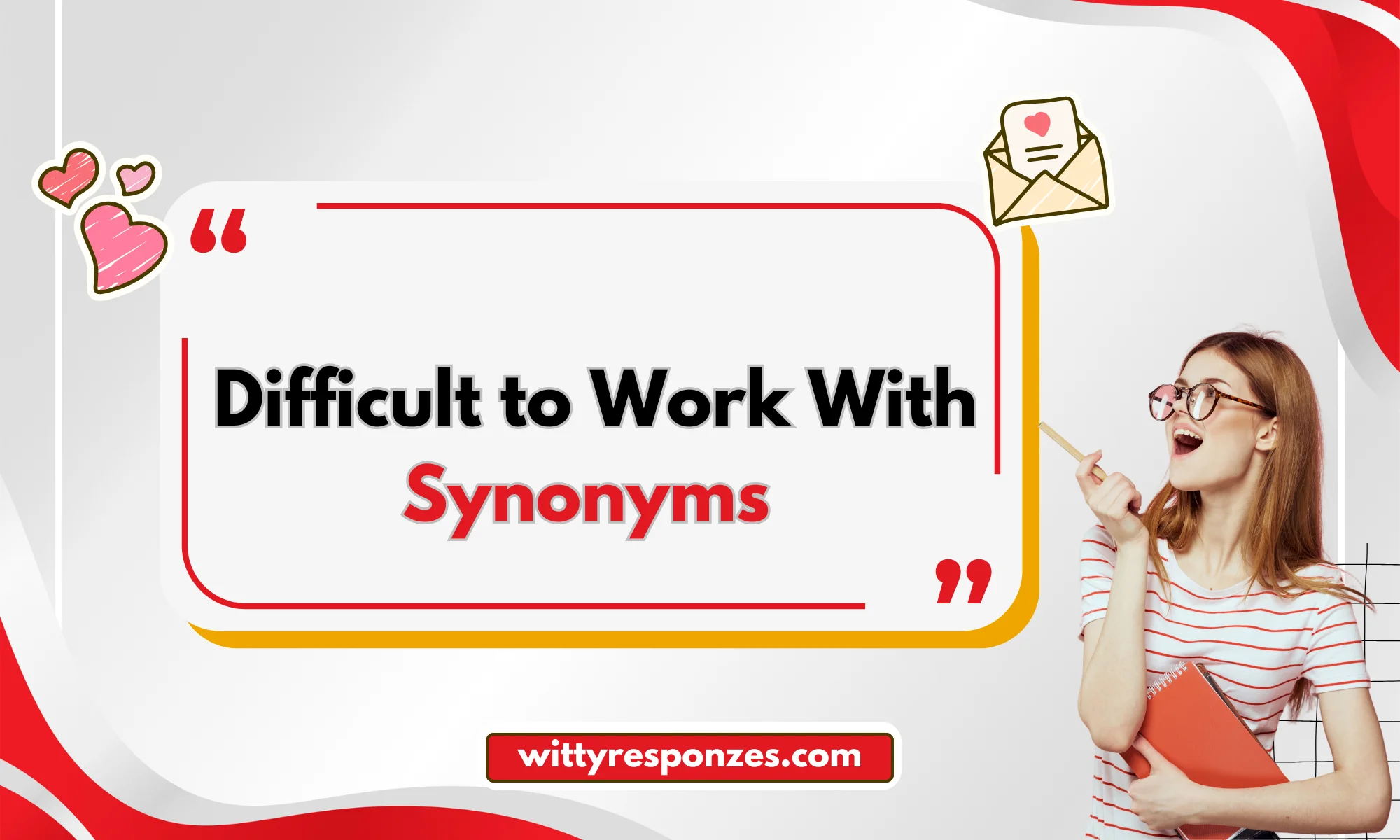In the world of communication and collaboration, finding the right words can make all the difference. When dealing with challenging personalities or situations, you might find yourself searching for synonyms to describe someone difficult to work with.
Whether you’re drafting a performance review or trying to convey a point delicately, having a variety of terms at your disposal can help. Here are synonyms that capture the essence of being tough to collaborate with, each explained in detail.
Top List Of “Difficult to Work With Synonyms”
- 1. Uncooperative
- 2. Difficult
- 3. Challenging
- 4. Contentious
- 5. Obstinate
- 6. Inflexible
- 7. Disagreeable
- 8. Hostile
- 9. Combative
- 10. Antagonistic
- 11. Irritable
- 12. Unyielding
- 13. Rude
- 14. Sullen
- 15. Disruptive
- 16. Neglectful
- 17. Indecisive
- 18. Selfish
- 19. Distant
- 20. Skeptical
- 21. Pessimistic
- 22. Perfectionistic
- 23. Manipulative
- 24. Resentful
- 25. Arrogant
1. Uncooperative
Uncooperative describes someone who refuses to work with others or follow common protocols. This can lead to frustration and hinder progress.
- Example 1: A team member who constantly disagrees with group decisions, ignoring input from others.
- Example 2: An employee who fails to adhere to company policies, making teamwork difficult.
- Example 3: A colleague who avoids sharing resources, creating roadblocks for others.
2. Difficult
The term difficult is straightforward but encompasses a range of challenging behaviours that make collaboration hard.
- Example 1: A person who frequently changes their mind, confusing projects.
- Example 2: Someone who is argumentative and often dismisses others’ ideas.
- Example 3: A team member who is often late or unprepared for meetings.
3. Challenging
Challenging refers to a person who presents obstacles, whether through attitude or behaviour, making it hard to achieve goals.
- Example 1: A manager who sets unrealistic expectations without considering team capabilities.
- Example 2: A co-worker who tends to focus on problems rather than solutions.
- Example 3: An employee who resists constructive feedback, making improvement difficult.
4. Contentious
Contentious describes someone prone to disagreement and argument, making collaboration strained and uncomfortable.
- Example 1: A team member who enjoys debating every decision, creating tension.
- Example 2: Someone who takes offence easily, leading to unnecessary conflicts.
- Example 3: A colleague who regularly disagrees with the majority opinion without constructive reasons.
5. Obstinate
Obstinate refers to a person who stubbornly refuses to change their opinions or actions, even when faced with logical arguments.
- Example 1: An employee who refuses to adapt to new methods despite evidence of their effectiveness.
- Example 2: A team member who insists on using outdated tools, hindering progress.
- Example 3: Someone who clings to their viewpoint, disregarding facts presented by others.
6. Inflexible
Inflexible describes a person who is unwilling to change or compromise, which can stifle creativity and collaboration.
- Example 1: A colleague who won’t entertain alternative solutions, causing frustration.
- Example 2: An employee who insists on sticking to a strict schedule, regardless of team needs.
- Example 3: Someone who has a rigid approach to problem-solving, limiting innovation.
7. Disagreeable
Disagreeable refers to an individual whose demeanour is unpleasant or difficult, often leading to friction in a group setting.
- Example 1: A team member who frequently criticizes others without offering help.
- Example 2: Someone who often makes negative comments that affect morale.
- Example 3: A colleague who disrupts discussions with rude remarks or dismissive gestures.
8. Hostile
Hostile describes a person who is openly unfriendly or aggressive, which can create a toxic work environment.
- Example 1: A manager who belittles team members in meetings, discouraging input.
- Example 2: A colleague who reacts angrily to constructive criticism, creating fear.
- Example 3: Someone who fosters tension through gossip or negative talk about others.
9. Combative
Combative refers to someone eager to argue or fight, making cooperative efforts nearly impossible.
- Example 1: A team member who responds to feedback with defensiveness and aggression.
- Example 2: Someone who frequently initiates conflicts over minor disagreements.
- Example 3: A colleague who is confrontational in discussions, derailing productivity.
10. Antagonistic
Antagonistic describes an individual who opposes or actively fights against the group’s goals or ideas.
- Example 1: A member who consistently works against team objectives instead of collaborating.
- Example 2: Someone who promotes dissent among colleagues, undermining teamwork.
- Example 3: A colleague who is always seeking to create divisions within the group.
11. Irritable
Irritable refers to a person who is easily annoyed, which can make working with them frustrating.
- Example 1: A co-worker who reacts with impatience to simple requests.
- Example 2: Someone who snaps at others over minor inconveniences.
- Example 3: A team member who frequently complains about workload, affecting others’ moods.
12. Unyielding
Unyielding describes someone who is firm in their opinions or actions and refuses to adapt, making collaboration difficult.
- Example 1: An employee who won’t consider feedback, even from supervisors.
- Example 2: A team member who sticks to their methods, regardless of better options.
- Example 3: Someone who holds onto outdated practices that hinder progress.
13. Rude
Rude describes a person who lacks manners or respect for others, making interactions uncomfortable.
- Example 1: A colleague who interrupts others frequently during discussions.
- Example 2: Someone who uses derogatory language or insults in casual conversations.
- Example 3: An employee who ignores common courtesies, affecting workplace morale.
14. Sullen
Sullen refers to someone who is gloomy or withdrawn, which can dampen team spirits and collaboration.
- Example 1: A team member who rarely contributes to discussions, leading to disengagement.
- Example 2: Someone who seems uninterested in team goals, affecting motivation.
- Example 3: A colleague who brings a negative energy to meetings, impacting morale.
15. Disruptive
Disruptive describes a person who interrupts or causes disorder in the work environment, making it hard to focus.
- Example 1: A co-worker who frequently talks over others during meetings, sidetracking discussions.
- Example 2: Someone who plays loud music or engages in loud conversations in shared spaces.
- Example 3: An employee who derails the agenda by introducing unrelated topics.
16. Neglectful
Neglectful refers to a person who fails to take care of responsibilities, making teamwork challenging.
- Example 1: A colleague who doesn’t follow through on tasks, leaving others to pick up the slack.
- Example 2: Someone who consistently misses deadlines, affecting group timelines.
- Example 3: An employee who doesn’t participate in team activities, creates imbalance.
17. Indecisive
Indecisive describes a person who struggles to make decisions, often leading to delays and frustration in a team setting.
- Example 1: A team member who takes too long to choose a project direction, causing hold-ups.
- Example 2: Someone who frequently changes their mind about assignments, leading to confusion.
- Example 3: A colleague who hesitates to commit to roles or tasks, affecting productivity.
18. Selfish
Selfish refers to a person who prioritizes their own needs over the team’s, making collaboration hard.
- Example 1: An employee who hoards resources instead of sharing with colleagues.
- Example 2: Someone who takes credit for team successes without acknowledging others’ contributions.
- Example 3: A team member who ignores group objectives to pursue personal agendas.
19. Distant
Distant describes someone who is emotionally or physically removed from the team, making connection and teamwork difficult.
- Example 1: A colleague who rarely participates in discussions or team-building activities.
- Example 2: An employee who communicates only through emails, avoids face-to-face interaction.
- Example 3: Someone who keeps personal matters private, preventing team bonding.
20. Skeptical
Skeptical refers to a person who doubts others’ intentions or ideas, which can hinder collaboration.
- Example 1: A team member who questions every proposal without offering constructive feedback.
- Example 2: Someone who is reluctant to try new strategies, impacting innovation.
- Example 3: A colleague who assumes negativity in others’ suggestions, creating distrust.
21. Pessimistic
Pessimistic describes someone who tends to see the negative side of things, which can demoralize a team.
- Example 1: A team member who always highlights potential failures instead of solutions.
- Example 2: Someone who undermines enthusiasm for new projects by focusing on challenges.
- Example 3: A colleague who dismisses positive feedback, affecting team morale.
22. Perfectionistic
Perfectionism refers to someone who sets impossibly high standards, making collaboration exhausting.
- Example 1: An employee who nitpicks every detail, slowing down project progress.
- Example 2: A colleague who is never satisfied with work, leading to constant revisions.
- Example 3: Someone who expects flawless execution from others, creating pressure.
23. Manipulative
Manipulative describes a person who influences others for their benefit, complicating teamwork.
- Example 1: A colleague who plays favourites, affecting team dynamics.
- Example 2: Someone who uses guilt to coerce others into doing their work.
- Example 3: An employee who distorts facts to mislead team decisions.
24. Resentful
Resentful refers to someone who harbours ill feelings toward others, impacting collaboration and trust.
- Example 1: A team member who expresses bitterness about not getting credit for work.
- Example 2: Someone who displays passive-aggressive behaviour due to perceived slights.
- Example 3: A colleague who undermines others because of jealousy, affecting teamwork.
25. Arrogant
Arrogant describes a person who has an inflated sense of self-importance, often disregarding others’ contributions.
- Example 1: A team member who refuses to listen to input, believing they know best.
- Example 2: Someone who dismisses ideas without consideration, impacting collaboration.
- Example 3: An employee who takes over projects without involving others, stifling creativity.
Conclusion
Finding the right words to describe someone difficult to work with can help clarify issues and foster better communication. Whether you’re addressing a problematic team member or navigating a challenging situation, these synonyms offer various ways to articulate the complexities of collaboration. With the right vocabulary, you can approach these conversations with sensitivity and professionalism, ultimately leading to more effective teamwork.

𝐈’𝐦 Ella Rose 𝐭𝐡𝐞 𝐜𝐫𝐞𝐚𝐭𝐢𝐯𝐞 𝐦𝐢𝐧𝐝 𝐛𝐞𝐡𝐢𝐧𝐝 “𝐖𝐢𝐭𝐭𝐲 𝐑𝐞𝐬𝐩𝐨𝐧𝐬𝐞𝐬 ” 𝐰𝐡𝐞𝐫𝐞 𝐰𝐞 𝐭𝐮𝐫𝐧 𝐨𝐫𝐝𝐢𝐧𝐚𝐫𝐲 𝐫𝐞𝐩𝐥𝐢𝐞𝐬 𝐢𝐧𝐭𝐨 𝐞𝐱𝐭𝐫𝐚𝐨𝐫𝐝𝐢𝐧𝐚𝐫𝐲 𝐛𝐮𝐫𝐬𝐭𝐬 𝐨𝐟 𝐡𝐮𝐦𝐨𝐫. 𝐖𝐢𝐭𝐡 𝐚 𝐟𝐥𝐚𝐢𝐫 𝐟𝐨𝐫 𝐜𝐫𝐚𝐟𝐭𝐢𝐧𝐠 𝐬𝐡𝐚𝐫𝐩 𝐰𝐢𝐭𝐭𝐲 𝐜𝐨𝐦𝐞𝐛𝐚𝐜𝐤𝐬. 𝐈 𝐬𝐩𝐞𝐜𝐢𝐚𝐥𝐢𝐳𝐞 𝐢𝐧 𝐦𝐚𝐤𝐢𝐧𝐠 𝐲𝐨𝐮𝐫 𝐢𝐧𝐭𝐞𝐫𝐚𝐜𝐭𝐢𝐨𝐧𝐬 𝐮𝐧𝐟𝐨𝐫𝐠𝐞𝐭𝐭𝐚𝐛𝐥𝐞. 𝐀𝐭 “𝐖𝐢𝐭𝐭𝐲 𝐑𝐞𝐬𝐩𝐨𝐧𝐬𝐞𝐬” 𝐨𝐮𝐫 𝐦𝐢𝐬𝐬𝐢𝐨𝐧 𝐢𝐬 𝐭𝐨 𝐢𝐧𝐟𝐮𝐬𝐞 𝐲𝐨𝐮𝐫 𝐜𝐨𝐧𝐯𝐞𝐫𝐬𝐚𝐭𝐢𝐨𝐧𝐬 𝐰𝐢𝐭𝐡 𝐜𝐡𝐚𝐫𝐦 𝐚𝐧𝐝 𝐜𝐥𝐞𝐯𝐞𝐫𝐧𝐞𝐬𝐬. 𝐃𝐢𝐯𝐞 𝐢𝐧𝐭𝐨 𝐭𝐡𝐞 𝐟𝐮𝐧 𝐚𝐧𝐝 𝐥𝐞𝐭𝐬 𝐦𝐚𝐤𝐞 𝐞𝐯𝐞𝐫𝐲 𝐫𝐞𝐬𝐩𝐨𝐧𝐬𝐞 𝐚 𝐦𝐞𝐦𝐨𝐫𝐚𝐛𝐥𝐞 𝐨𝐧𝐞𝐣𝐨𝐢𝐧 𝐮𝐬 𝐚𝐭 𝐖𝐢𝐭𝐭𝐲 𝐑𝐞𝐬𝐩𝐨𝐧𝐬𝐞𝐬 𝐟𝐨𝐫 𝐚 𝐝𝐨𝐬𝐞 𝐨𝐟 𝐝𝐞𝐥𝐢𝐠𝐡𝐭𝐟𝐮𝐥 𝐡𝐮𝐦𝐨𝐫.
